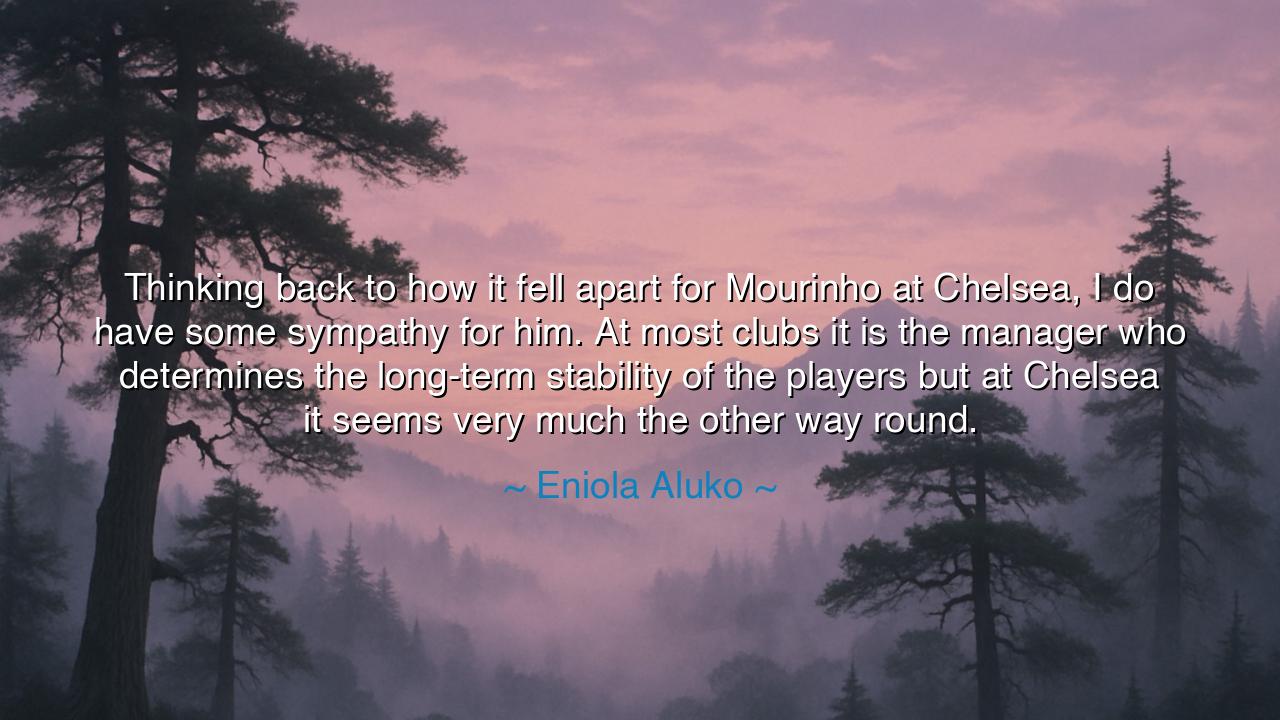
Thinking back to how it fell apart for Mourinho at Chelsea, I do
Thinking back to how it fell apart for Mourinho at Chelsea, I do have some sympathy for him. At most clubs it is the manager who determines the long-term stability of the players but at Chelsea it seems very much the other way round.






Hear the words of Eniola Aluko, a warrior of the pitch and a voice of wisdom, who reflected on the fall of a great football general: “Thinking back to how it fell apart for Mourinho at Chelsea, I do have some sympathy for him. At most clubs it is the manager who determines the long-term stability of the players but at Chelsea it seems very much the other way round.” In these words, she lifts the veil upon the struggles of leadership, the shifting tides of loyalty, and the fragile balance of power that determines the fate of men and teams alike.
The meaning of her words lies in the paradox of command. In most kingdoms of sport, it is the manager who sets the tone, who decides the vision, who molds the players to his will, as a general molds an army. Yet in the house of Chelsea, she observes a reversal: there the players, not the leader, often hold sway, their strength undermining the one who should lead them. Thus she feels sympathy for Mourinho, a man of iron will and tactical genius, who in that place found his authority eroded, his throne weakened not from outside foes, but from within.
History itself echoes this tale. Recall the fate of Julius Caesar, master of Rome’s legions. His power was absolute in battle, yet within the Senate, among supposed allies, daggers were drawn. Authority crumbled not because of foreign enemies, but because loyalty faltered at home. In like manner, Mourinho’s Chelsea fell not for lack of brilliance, but because the balance between leader and followers had shifted. When players dictate terms to the manager, as senators once dictated terms to Caesar, the order of power collapses, and with it the empire.
There is also the lesson of Napoleon Bonaparte, whose soldiers once adored him as their emperor. His strength lay in their devotion; they would march through fire for him. But when that devotion waned, when hunger and fatigue outweighed loyalty, his campaigns faltered, and he was cast into exile. Leadership, Aluko reminds us, depends not only on the will of the commander but on the fragile, living bond between leader and those led. When that bond reverses—when the followers command the master—the structure is undone.
The lesson for us, then, is not only for the world of sport but for every realm of leadership. A leader must command with vision, but also with humility; he must earn loyalty, but also guard against its corruption. Followers, too, must know their place: to support, to challenge when needed, but not to usurp. For when the chain of order is broken, chaos reigns, and even the greatest fall. Mourinho’s plight at Chelsea is but one more chapter in this eternal story: the tragedy that comes when authority is weakened from within.
Practical action follows: if you lead, guard the balance. Do not rule with tyranny, for then the people will turn against you. Do not yield all authority, for then the people will lead you astray. Instead, cultivate mutual respect, so that your command is upheld not by fear, nor undermined by rebellion, but sustained by trust. And if you follow, honor the role of the leader. Support him in strength, challenge him in wisdom, but do not destroy the structure upon which your own success depends.
So let the words of Aluko stand as both lament and counsel. Sympathy is due to the fallen leader, for even the mighty may be undone when loyalty wavers. But wisdom is also given to us who listen: that in sport, in politics, in life itself, the harmony between leader and follower must be guarded as a sacred bond. For when the players lead the manager, or the soldiers command the general, or the people rule without order, the house collapses. And only those who learn this truth may endure with stability, whether on the field or in the greater battles of life.






AAdministratorAdministrator
Welcome, honored guests. Please leave a comment, we will respond soon